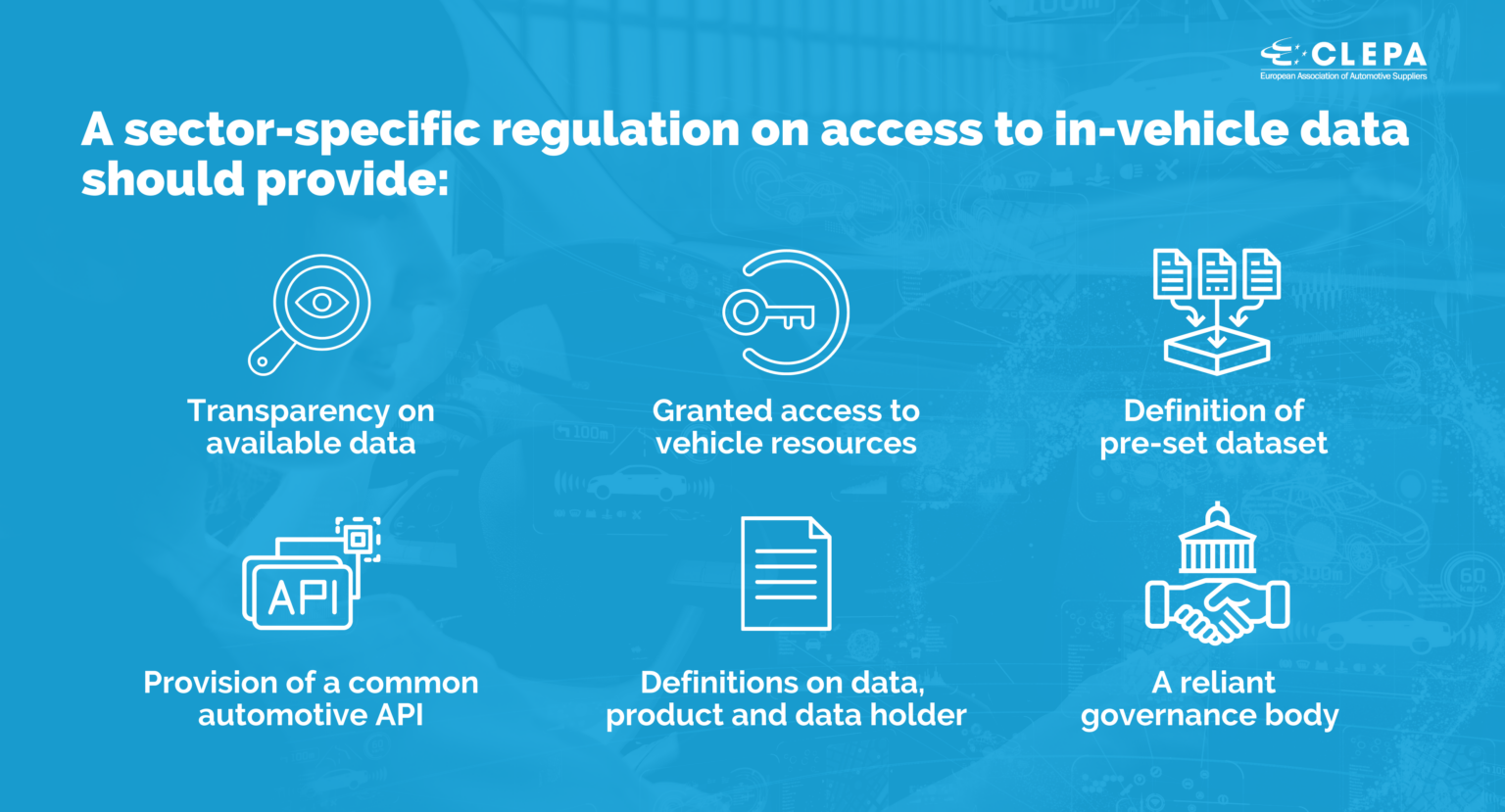
EU trade group backs call for in-vehicle data access, REPAIR Act re-introduced in the U.S.
By onInternational | Legal
EU parts supplier and trade association organization, CLEPA, has published a new position paper, jointly with the union’s mobility service ecosystem that urges the introduction of regulatory guidance on in-vehicle data access by the European Commission.
In the U.S., the issue is also being legislated federally under the newly re-introduced Right to Equitable and Professional Auto Industry Repair (REPAIR) Act (H.R. 906), which supporters claim will ensure access to “all tools and equipment; wireless transmission of repair and diagnostic data; and access to on-board diagnostic and telematic systems needed to repair a vehicle.”
The new REPAIR Act, introduced in the House on Feb. 9, is sponsored by United States Rep. Neal Dunn (R-FL), and co-sponsored by Reps. Brendan Boyle (D-PA-02), Warren Davidson (R-OH-08), and Marie Gluesenkamp Perez (D-WA-03)
However, the request for in-vehicle data may not always be for the same objective as accomplishing the “right to repair.”
In a memo by the Alliance for Automotive Innovation (AAI), addressing a telematics ballot initiative in Maine, the alliance states, “Automotive right to repair already exists and always will. …Automakers agree and support numerous initiatives to facilitate seamless independent auto service and repair.”
CLEPA said it backs up a letter recently penned by the Independent Service Providers Group (ISPs) sent to the European Commission president that asks for “swift action” toward creating regulations so consumers and businesses can “enjoy the benefits of data-driven innovation, choice and affordability in the automotive and mobility ecosystem. This can only happen provided the right regulatory framework is in place.”
In a news release, CLEPA said “the continued delay risks access to the untapped potential in creating real competition for consumers and companies all over the EU.”
In its position paper, CLEPA details why the Data Act “will not ensure a level playing field for the use and sharing of in-vehicle data, and how the current absence of regulation is impacting companies and consumers, with recommendations on key aspects needed for a successful sector-specific regulation.”
While CLEPA believes that the Commission’s Data Act proposal, published last year, serves as a framework for data access, the organization said a sector-specific regulation needs to be proposed and passed during the current parliamentary term “to remove existing roadblocks in the deployment of innovative services and to foster investments in the use of in-vehicle data and resources.”
At the crux of the Data Act is granting consumer and business access to and use of connected device data for aftermarket and value-added services, like predictive maintenance.
“Strong competition between vehicle manufacturers and the independent aftermarket has ensured a fair level playing field in the past, leaving consumers with free choice on where to obtain a vehicle service,” CLEPA said. “Any privileged position of competing players regarding data access will limit consumer choice.”
According to CLEPA, there are currently about 44 million automaker-connected vehicles on EU, EFTA, and UK roads; 50% of which can be accessed by third parties but on a limited basis.
“Representing automotive suppliers in the EU, CLEPA believes this lack of progress is caused by missing transparency on available data, the lack of a common set of data, and the complex processes for the user consent management,” the position paper states. “In parallel, vehicle manufacturers are increasingly introducing Application Programming Interfaces (API) in their infotainment systems, providing an environment to run applications which can make use of in-vehicle data directly in the vehicle. CLEPA expects that about 100 million vehicles globally will be equipped with such APIs already by 2025. In the mid-term, CLEPA foresees that the utilization of data directly in the vehicle will be as relevant as the use outside of the vehicle.”
CLEPA recommends automotive sector-specific regulations to complement the commission’s Data Act include:
-
- “Transparency on available data by vehicle identification number, including metadata and formats;
- The definition of a preset standardized minimum dataset;
- Sector-specific definitions on data, product, and data holder;
- Granting access to vehicle resources like display, audio, API environments, and embedded
software routines; - Provision of a common automotive API to ensure data flow from the sensor to the service as
already in development by COVESA and AUTOSAR1; and - A governance body or structured forum to set a framework to assign respective roles, rights, authorization, and liabilities, as well as processes for the provision of user consent and API releases and the regular revision of the standardized minimum dataset.”
CLEPA asks for transparency of accessible data points by each individual vehicle, consent management and applications validation guidance, data cost, and the definition of a pre-set standardized minimum dataset “to allow cross-brand services.”
“Without these principles in place, the developing digital market in automotive runs the risk of further distortion of competition in after sales and on the market for new mobility services due to economic actors gaining or cementing a gatekeeping position in the market for such services. Conversely, fair competition will ensure increased choice for consumers and amplification of innovative services,” CLEPA’s position paper states.
Images
Featured image credit: keremberk/iStock
Sector-specific regulation graphic provided by CLEPA

